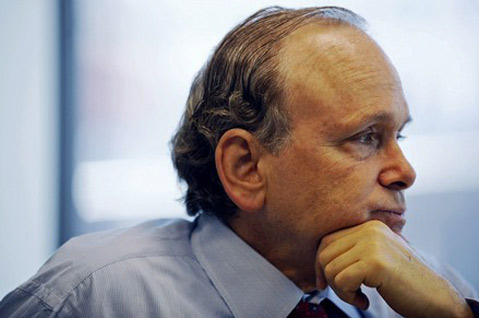Energy Expert Plugs Into S.B.
Daniel Yergin Will Speak on Energy Security

If you make it to the photo plates sandwiched between pages 534 and 535 of Daniel Yergin’s just-released book, The Quest: Energy, Security, and the Remaking of the Modern World, you’ll find an image of Santa Barbara resident Jim Dehlsen as a hard-hatted young man posing atop Tehachapi Pass like a conquistador towering over a long line of wind turbines receding along a ridge into the horizon.
Dehlsen was one of the early pioneers of wind-turbine technology who had the foresight to take advantage of state tax breaks after the 1979 oil crisis and import Danish technology to start Zond Energy, which he eventually sold to GE before founding Carpinteria-based Clipper Windpower and his latest venture, Ecomerit Technologies, to design offshore renewable energy devices.
In writing about renewable energy, Yergin — who is giving a free lecture at UCSB on October 12 — widens his scope from The Prize: The Epic Quest for Oil, Money, and Power, his 1991 Pulitzer Prize-winning history of oil. The Quest is an expansive tome that opens with the geopolitics of oil before transitioning into respective sections on energy security, electricity, climate change, new energy technologies, and efficiency.
One of the most compelling reasons to read The Quest is that, despite its geographical and historical scope, it offers a historical context to a slew of nearby energy-related concerns, from leaking oil casings off the coast of Summerland to the fracas over smart meters.
Yergin, a native of Los Angeles, turns his focus to Southern California more than once in The Quest. In an interview with The Santa Barbara Independent, he said that, during the course of his research, he enjoyed learning how directly modern efforts at developing electric cars stemmed from smog in the L.A. basin and the state’s subsequent efforts, primarily through the formation of the California Air Resources Board, to clean it up.
The Quest, however, is no environmentalist’s pipe dream. Yergin does not proclaim — like every president since Nixon has — that we can be energy independent. Nor does he believe that the majority of our electricity will be produced by anything other than fossil fuels in the next two decades. That includes natural gas extracted through the controversial practice of hydrofracturing (or fracking), in which a chemical cocktail is applied at high pressures to gas trapped in underground shale. (It was recently discovered that local oil company Venoco is fracking — and potentially polluting groundwater — in the North County.)
Some reviews of The Quest have taken Yergin to task for refusing to criticize the sins of the oil industry, to which he serves as a consultant. And, although he points out the dangers — environmental and otherwise — of extracting and burning fossil fuels, he does not sound an alarm. If he is too cozy with the oil industry, Yergin nonetheless offers an informative, sober, realistic, and extremely readable text.
Much of the early sections cover ground that a regular newspaper reader might be familiar with, but he always reminds us how energy policy underlies recent events such as the Arab Spring protests or the disaster at the Fukushima-Daiichi nuclear power plant in Japan. The rest includes historical vignettes about the often-quirky scientists, engineers, policymakers, and entrepreneurs who helped lay the foundations of our current energy infrastructure. For instance, we learn that Thomas Edison electrocuted small animals in order to persuade the public of the dangers of alternating current. (He lost that public relations battle, as well as business to George Westinghouse, whose transformers enabled large centralized power plants.)
If there is anything close to a central thesis in such a wide-ranging text, it is that the United States (along with the rest of the world) must both diversify its energy portfolio and increase efficiency in order to maintain security. Yergin feels that increased energy efficiency, which may lack the sex appeal of switchgrass biofuel, is just as, if not more, important to solving our energy dilemmas than finding new fuel sources. He told The Independent that he is excited to learn about UCSB’s Institute for Energy Efficiency when he visits Santa Barbara next week.



